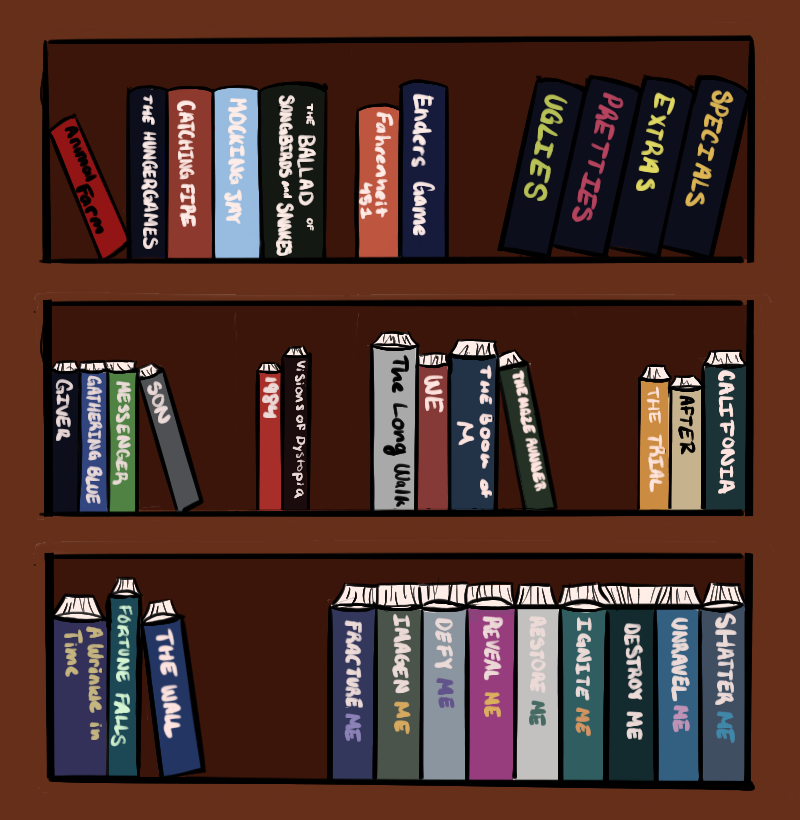From George Orwell to Suzanne Collins, dystopian fiction—a genre seeking to unveil sociopolitical flaws—has risen in popularity over the past few decades. Usually, these novels chronicle an oppressive government controlling the public through lies and propaganda, causing an idealistic revolution. Violence ensues, and the rebels win and establish a peaceful government with features like fair elections, separation of powers, and political freedom—a government similar to that of a modern representative democracy. Dystopian media has negative implications: issues arise when dystopian violence is used as justification for real-world violence and when it diverts attention from issues rather than revealing them. Additionally, when writers and producers exploit a story rather than maintaining its integrity, the messages and morals take a back seat to money-making. While intending to expose sociopolitical issues, dystopian stories often glorify modern flawed systems, incite real-world hyperviolence, or are corrupted by capitalistic intentions. Thus, dystopias contribute to the corrupt conditions that they supposedly denounce and undermine democratic principles.
More modern dystopian stories often end up glorifying real-world flaws. Dystopias push societal issues to their extremes and intend to expose hidden problems. Often, the image of a faulty government is hugely corrupt, murderous, and deceitful, and the utopian solution is a democracy similar to that of modern nations. The actual result of this phenomenon is readers idealizing their country’s unjust systems, which is counterproductive and diverts attention from real-world inequities. For example, the 2005 novel Ugliesby Scott Westerfield portrays the extreme society in which people are deemed ugly until they receive government-issued cosmetic surgery. While the novel aims to criticize beauty standards, pretty privilege, and government interference, it may overexaggerate said issues to the point where readers focus on the fact that our society isn’t as bad as it is portrayed in the novel. Instead of focusing on the commentary about contemporary society, dystopian novels serve as a distraction from social issues.
Dystopian fiction can also be weaponized, contradicting the democratic principles they hope to perpetuate. This contradiction is illustrated in the dystopian novel Fahrenheit 451. In the novel, horrifyingly violent media is shown on TV screens throughout the nation, instigating the characters’ violent tendencies. Today’s society worryingly parallels Ray Bradbury’s dystopia: The Washington Post found that subjects were more likely to justify violent protest and rebellion after reading or watching an excerpt from a dystopia. Political violence often blights empathetic discourse and compromise, which, according to professors Calvert Jones and Celia Paris, are “necessary for democracy to thrive.” Thus, by perpetuating violence and compromising discourse, dystopian fiction hypocritically undermines democracy.
When dystopian franchises are treated as a money-making machine rather than an art with sociopolitical value, they are milked and stripped of true meaning. One example is the recent reality TV show “Squid Game: The Challenge,” which replicates the challenges in the popular Netflix show “Squid Game”. The original show was a fresh take on the horrors of capitalism, focusing on needy characters fighting for 4.56 billion yen in a set of fatal challenges, all for the viewing pleasure of a sadistic and wealthy audience. “Squid Game: The Challenge” is precisely what the original series warned against, except the players are real people, and the wealthy audience is the viewers watching from home. The original “Squid Game” series made Netflix $900 million, and the new show has garnered over 170 million hours watched in the first two weeks, according to Bloomberg and Tudum. These metrics indicate the show’s success, which is why Netflix made more media based off the franchise: solely for extra profit. To Netflix, the money and success gained from their dystopian shows is worth more than morals, undermining the original’s powerful message.
Dystopias are typically seen as an agent of positive change. However, when they are used to hide flaws, make money, or cause violence, they become dangerous. While many dystopias fall into these problematic pitfalls, some are effective. Suzanne Collins, author of The Hunger Games, explores the dangers of totalitarianism through the character of President Snow and corrupt democracies through the character of President Coin in her bestselling trilogy. Collins explicitly denounces the violence she portrays in the novels and illustrates that under corruption, nobody is safe, not even the powerful. Collins also avoids overproducing her work—she only writes when she has something new to say. Her prequel, published ten years after the original trilogy, offered fresh insight into themes of control, war, and betrayal, thus expanding on the original’s purpose. The Hunger Games is an exemplary dystopian franchise, as it maintains integrity, realistically portrays the current flawed world, and denounces political violence. Dystopian stories are challenging to execute correctly, but when carefully done they can positively impact their readers.






































